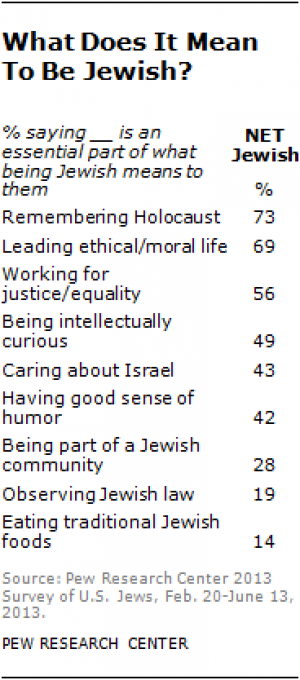A Wakeup Call: A Turning Point for Social Justice Judaism

Elisheva Biernoff, The Tools Are in Your Hands, proposal drawing, 2013. Courtesy of the artist and Eli Ridgway
Another piece about Pew? Yes. Why now? Because this stands out as an especially exciting moment in the Jewish-future conversation: It’s the moment when many of us are pivoting from debate to action. That’s why the questions we ask — and keep asking — matter.
Some 130 leaders from 37 Jewish social justice organizations asked questions about the Jewish future at last week’s Jewish Social Justice Roundtable’s Network Assembly. For me, the most important question was this one: What is the potential of our current political moment? The closest we came to an answer was when Rabbi David Saperstein stood up and said that the Pew study validates social justice as a pillar of Jewish life in a new way. He asked us to consider how important it is to ask the question: Is social justice part of your Jewish identity? Pew asked that question. And the answer rings out, loud and clear.
An Affirmation, A Challenge
56% of Jews say that being Jewish means working for justice — that’s both an affirmation and a challenge to everyone engaged in the Jewish social justice field. It shows that American Jews crave a purpose, a connection to this part of their Jewishness, as well as physical and emotional places to come and be in a community that welcomes people’s whole selves and identity. Simply put, it proves the authentic need and audience for Jewish social justice work.
And yet, Pew challenges us. American Jews doing social justice work is nothing new. But the field of Jewish social justice is an emerging yet mighty one.
An Opportunity to Grow
Pew isn’t just an affirmation of social justice work. It’s a wakeup call that we can do better: There is huge potential — for engaging more American Jews in our sector, but also to have a profound impact on pressing issues our society faces. It’s about more than growing our ranks. We want to make our cities, our states, our country, even the world a more just place, and we do so in a way that reflects Jewish values.
Pew challenges us by illuminating an audience that yearns for our work and could help us achieve the policy and cultural shifts we want to see.
The Jewish community is unique in that overall, we are disproportionately involved in government, civic leadership and business. As just one example, 70% of Jews vote. That’s twice the average rate of Americans. So the question is, as a community, how can we make the most of our position to make real change in America. Some American Jews struggle every day with poverty and powerlessness. And others have more access and influence than Jewish people have ever had. So the question, will this influence be used to achieve positive social change? Many of us in the Jewish social justice field are working to make the answer to that question an absolute yes.
At the same time, Pew raises other points, ones we need to think about together.
OK, intermarriage rates hold steady or increase, well depending on interpretations.
So the question becomes: What do we do to create welcoming and still authentic Jewish experiences?
OK, Jews, like other Americans, are increasingly self-identifying as having no religion.
So we must ask: How do we create nonreligious but still Jewish points of entry?
I love the ideas being generated or raised up in response to these questions. Some answers are clear. Why? These trends are not particularly new (though many of the details are), and they have been shaping the Jewish community landscape for decades.
The Big Questions
These are big questions — how should we capitalize on the hunger for our work using existing resources? How do we translate our community’s love of civic engagement into positive social change? It’s not easy to find time and space to grapple with these questions!
The Jewish Social Justice Roundtable created the space last week to do just that. And now, we are bringing our energies back to the communities where we work year-round on collaborative campaigns, currently focusing on immigration. We’ll build the visibility of our field. We’ll lift each other up and support each other’s work. And we’ll strive to be better
We’ll ask, what would it take to translate our strengths into lasting positive change for our communities. In part, our answers are our dynamic projects, projects dealing with economic justice, women’s rights and community organizing.
Opportunities Abound: A Sampling
*If you’re a young person doing anti-poverty work in NYC, you can apply for AVODAH’s brand-new fellowship program.
*If you’re a rabbi interested in global justice, apply for AJWS’ Global Justice Fellowship
*If you’re looking for wise Jewish guidance on community organizing, read Rabbi Jill Jacobs’ book “Where Justice Dwells: A Hands-On Guide to Doing Social Justice in Your Jewish Community.”
*If you’re an Orthodox Jew, connect with the leaders of Uri L’Tzedek and support their Tav HaYosher campaign in NYC restaurants.
*If you’re a feminist, follow NCJW on Twitter or in your city to meet amazing women working to make the world a better place.
*If you live in the Twin Cities, San Francisco, Los Angeles, Chicago, Boston, New York or Washington, DC — mazel tov! You’re lucky enough to have a local Jewish social justice group organizing on the ground. Get on their email lists and go to their next event. That’s (Jewish Community Action)[http://bit.ly/10dSUZl], Bend the Arc, Jewish Council on Urban Affairs, Jewish Alliance for Law & Social Action, Jews for Racial and Economic Justice, and Jews United for Justice, respectively.
*If you’re passionate about LGBT equality and rights, support Keshet.
*If you’re a funder, you can double your impact for Jewish social justice by participating in the Jewish Social Change Matching Fund.
This is just the tip of the iceberg of how we #DoPew. Our answers will change, because the Jewish social justice movement is vibrant and constantly changing.
How would you like to see the social justice pillar of Judaism grow and change? How do you #DoPew?
Let’s keep asking questions. There’s nothing more Jewish than that.
Abby Levine, director of the Jewish Social Justice Roundtable, has over a decade of experience working for social justice through organizing, nonprofit management and fundraising. She was the founding San Francisco staff member and program director for Progressive Jewish Alliance, now part of Bend the Arc. She went on to work during the 2008 election cycle as central Ohio field director for America Votes. She spent three years as development manager for DC Vote, which works for congressional representation for DC residents. Born and raised in Washington, DC, Abby now lives on Capitol Hill with her husband and 2-year-old son, Zachary. She loves chocolate, yoga and playing with trains with Zachary.
About the Artwork: Elisheva Biernoff’s drawing, pictured here, is on view through January 20th at the Contemporary Jewish Museum in San Francisco as part of “Work in Progress: Considering Utopia.”
![[the current issue of ZEEK]](../../image/2/100/0/5/uploads/leftistethicistgraphic-52842c6a.png)
- 5000 Pages of Zeek
- Founded in 2001, Zeek was the first Jewish online magazine, and we have over 5000 pages online to prove it, all available free of charge. Read more in the Archive.
More articles in


